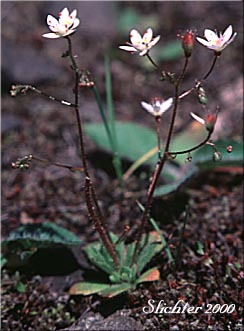Rusty saxifrage in bloom on basalt outcrops atop Mount Hebo, Siuslaw National Forest........June 2, 2021.
Rusty saxifrage in bloom on basalt outcrops atop Mount Hebo, Siuslaw National Forest........June 2, 2021.

Photo at right of rusty saxifrage from Silver Star Mt., Gifford Pinchot N.F........July 4, 1991.
Rusty saxifrage is a perennial with single, simple stems arising from 15-35 cm high from a cluster of several basal leaves. The one to several stems arise from a taproot, are short-hairy below and glandular above, and may be branched. The stems are flowered from near the base to the tips of the stems .The thick leaf blades are oblanceolate to obovate, tapered gradually to wide petioles. The leaf tips are blunt, and the margins are 7-17 toothed.
The inflorescence is an open panicle, the branches spreading widely. The flowers may be fully developed, or may be bulblets instead. Individual flowers are white with 5 petals. Two kinds of petals are present, three that are broad, each with 2 orange-yellow spots near the base of the petal (See photo at the top of the page.) and two narrower ones without markings. The petals are about 4-6 mm long. The calyx has 5 lobes or sepals, each nearly free to the base. They are rusty colored, hence the species name ferruginea, and they range from 1.5-2.5 mm long. The stamens are about as long as the petals. The filaments are white with red or rusty anthers. The ovary is almost completely superior.
Rusty saxifrage may be found growing on moist open slopes or open rocky ground at higher altitudes.
Rusty saxifrage may be found from Alaska south through the mountains of British Columbia to the Cascades and Olympic Mts and further south to northwestern California. It is found east to the mountains of Idaho and Montana.
Close-ups of rusty saxifrage as seen atop Saddle Mountain in the Coast Range of northwestern Oregon.........June 14, 2009.

Saxifraga ferruginea from Silver Star Mt., Gifford Pinchot N.F........July 4, 1991.